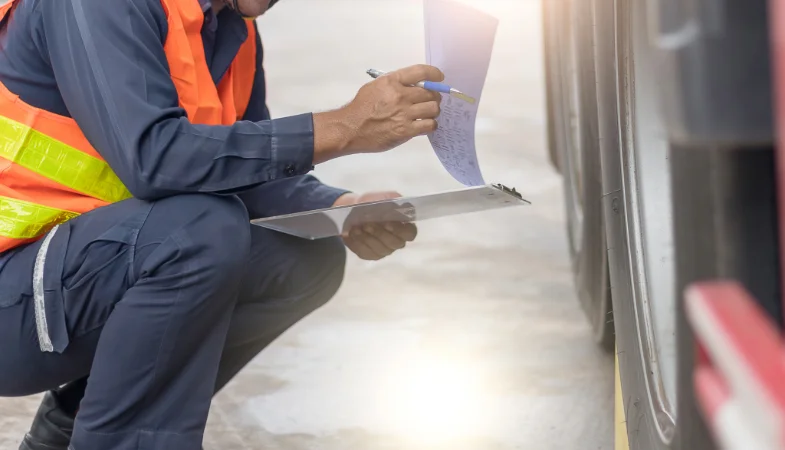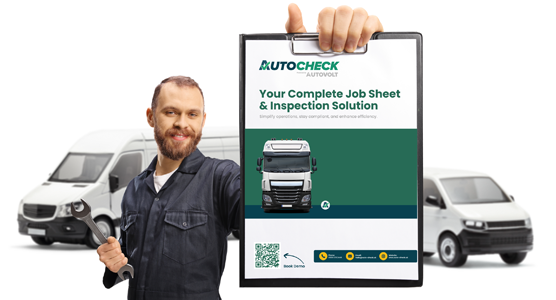Does your fleet compliance process meet DVSA standards?
Fleet compliance is a constant challenge. DVSA inspections and Traffic Commissioner hearings can have a serious impact on operators who do not meet compliance standards. What happens if your compliance process doesn’t meet these standards? Is there an easy way to make sure it does? Failure to manage compliance can lead to prohibitions, fines, and even licence loss. Traffic Commissioners for Great Britain reported that, in a public inquiry at the end of April this year, Deputy Traffic Commissioner Nick Denton revoked the international goods vehicle operator’s licence held by Transglobal Solutions Ltd. This was the result of a pattern of non-compliance, including vehicles being operated without MOT’s and road tax, failure to download tachograph data, and extended operation of vehicles without driver cards. Our free Fleet Compliance Checklist gives fleet operators, workshops, and transport managers a clear, practical way to measure their systems against DVSA standards. We provide the easiest way to put it all into practice, for your peace of mind.
Why is it important to meet DVSA standards?
DVSA standards relate to the responsibilities and systems involved in keeping vehicles in a roadworthy condition. These standards are often required under Road Traffic law, Health and Safety legislations, and the legal undertakings of the Traffic Commissioner. The DVSA Guide to maintaining roadworthiness and the Traffic Commissioner Strategic Objectives from 2023 to 2025 focus on the following:
Key areas
• Roadworthiness: this means following the appropriate vehicle construction, road safety, environmental, and operating standards required by law in the UK.
• Record-keeping: storing records securely, e.g., keeping records of safety inspections for at least 15 months for all vehicles.
• Driver oversight: recognising that drivers are legally responsible for the condition of their vehicle when in use, and that any defects found during the daily walk-around check, while the vehicle is in use, or on its return to base, must be reported by the driver or someone responsible for recording vehicle defects.
• Fair competition: the aim is to promote and develop a safe road transport industry, which delivers compliance, fair competition, and protects the environment.
What are common failings that lead to enforcement actions?
• Insufficient maintenance records, policies, and procedures
• Misuse of tachograph
• Breaches of licence, regulations, or advise
• Unidentified or unreported vehicle defects
Is there an easy way to manage compliance?
Our Fleet Compliance Checklist is a valuable, free resource for the use of fleet operators, commercial garages or workshops, transport managers, compliance officers, and business owners. The checklist is based on DVSA Roadworthiness Guidance and Traffic Commissioner priorities, and features the following sections:
Checklist sections
• Driver Daily Checks
• Safety Inspections & Maintenance
• Record Keeping & Documentation
• Workshops & Maintenance Providers
• Operator Licence Responsibilities
• Culture & Continuous Monitoring
These sections ensure that vehicles maintain roadworthiness, records are made correctly and kept securely, drivers are aware of their responsibilities, and a safe road transport industry is developed. Our Fleet Compliance Checklist is the practical, simple solution to managing this, and is designed specifically for operators, workshops, and transport managers.
What are the benefits of using the Fleet Compliance Checklist?
Our Fleet Compliance Checklist enables operators to take a quick self-assessment of compliance systems, such as daily walk-around checks, safety inspections, quality assurance checks, and internal audits. The checklist highlights gaps relating to roadworthiness, record-keeping, driver oversight, and fair competition, before the DVSA or Traffic Commissioner identify them during compliance checks. It provides a simple, structured framework for operators, workshops, and transport managers to use and to keep record of.
Why Autocheck?
We take the checklist from theory into practice, helping you stay compliant by automating inspection reminders, storing all records securely indefinitely, linking defects to repair jobs for a full audit trail, and producing instant audit-ready reports. If you’d like to see how Autocheck automates this process, book a quick demo.






